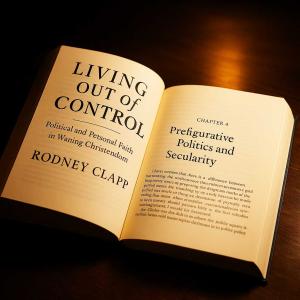Here I continue my discussion of Rodney Clapp’s book Living Out of Control: Political and Personal Faith in Waning Christendom. This week’s chapter is Eight: Friendship. If you have read the chapter, feel free to comment. If not, feel free to ask a question.
As often, Rodney gives us the “gist” of the chapter in the penultimate paragraph—with a sentence after that. Here is the gist: “I thank God for friends inside and outside the church who largely agree with my prudential discernments on governmental politics. But no less, and in some ways more, I thank God for those friends who disagree. They keep me honest. They remind me not to confuse my highest governmental political goals with the arrival of the kingdom of God in its fullness. And in our joy together they remind me that there is more to life than governmental politics—so much more.” (110)
Rodney has a deep sense of the meaning of friendship. To him, friends are a gift from God and “In a deep friendship, we are committed to another person—the whole person, with all her virtues and flaws, all her fine points and foibles.” (103)
I suppose the main point of this chapter is that friendship can be a school for living out of control. That means that from friendships we learn not to try to control others but to be vulnerable and willing to change. The church should be a sphere of friendships. Friendship is anarchic. Dissent is safe within friendship.
I wonder some things about Rodney and friendship. Speaking personally, I have had some very close, even deep friendships that dissolved. In a few cases my friends unfriended me. In a few cases I unfriended them. (And here I am not just talking about on Facebook!) People change. I change.
I had a friend who lived in France but spoke excellent English. We met at university. We formed a close bond of friendship. We shared intimate things about our lives with each other. I visited him in France twice for several days at a time. We corresponded when we could not be together. Then, suddenly, silence. Several letters went unanswered. I never did find out why.
I had a friend who was like a brother to me. In fact, he was my foster brother for several years. Then, he went wild. He began to live a very profligate lifestyle with alcohol, drugs and illicit sex. He pulled away from me and I pulled away from him after making a sincere effort to hold onto him. We drifted apart. Years later I located him and we corresponded. Eventually we talked on the phone. But we were never friends as before. Then the correspondence and phone conversations stopped. Later I found out he died of liver cirrhosis.
To me, friendships come and go. I have two friends that are lifelong friends since were were teens. We’ve had our ups and downs over the years, but we hang in there in spite of some strong disagreements about politics.
For the last several years I have been friends with my pastor and our friendship means much to both of us. I dread the day that he leaves and moves to another city—if that should happen. But could our friendship dissolve over something else, over a difference of belief or lifestyle, for example? I believe it could happen.
To me, Rodney’s description of friendship is idealistic. Over the years of my life I have had many, many friends. Some very close and some not so close, but all friends. But too many of my friendships have ended for me to place friendship up on the pedestal where Rodney places it. I am ready to end a friendship in case of betrayal without apology or mere distance of interest and belief that is too far to close. Giving up on a friendship is sad. But sometimes you have to just move on after a time of attempting reconciliation and waiting.
*Note: If you choose to comment, make sure your comment is relatively brief (no more than 100 words), on topic, addressed to me, civil and respectful (not hostile or argumentative), and devoid of pictures or links.*













